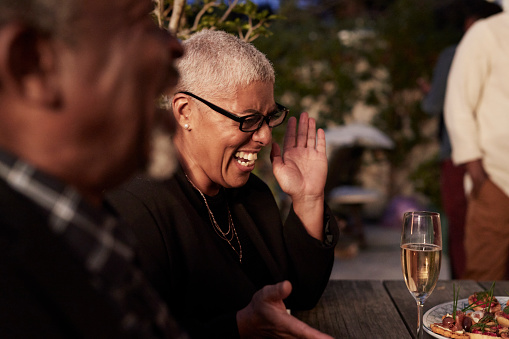We Need Other People to Be Happy
3 minute read
Science shows that human beings are highly social. It’s in our DNA to have people around us, and when we do, our bodies and overall health are better for it. Richard Leider, Education Fellow in the Alliance’s Lifetime Income Institute puts it this way in his book Life Reimagined – “Isolation is fatal. In fact, isolation can take up to seven years off your life. Isolation contributes to heart disease and depression; it influences your immune system and leads to faster aging and advanced health problems. The antidote is community, or connectedness. The hunger for connection holds true for both men and women – although women seem to do better at connecting. Which may explain why women live, on average, seven years longer than men.”
WATCH Your Money Map: Making friends and finding community as you age
Peter Kaldes, CEO and President of the American Society on Aging, joined Jean Chatzky on Your Money Map to discuss making friends and finding community as you age on November 16, 2022.
Countering Ageism Through Multigenerational Communities and Programs
John Lennon’s perspective on the role your social life plays as you age – “count your age by friends, not years” – is certainly supported by psychologists, but most cultures and the media continue to emphasize the negative when it comes to aging. The World Health Organization defines Ageism as, “the stereotypes (how we think), prejudice (how we feel) and discrimination (how we act) towards others or oneself based on age.” It can be seen in the way advertisers market anti-wrinkle creams to how companies screen out/weed out older workers. Less obvious, though, are the subliminal ways getting older is framed. Shutterstock and the American Society on Ageing (ASA) have created “Telling Age-inclusive Stories” to address the fact that just 5% of U.S. advertising is aimed at people older than age 50, even though this demographic dominates spending (Harvard Business Review 2020).
“We want to capture a whole person — the passion, the curiosity, and all the optimism that exists in aging,” said Peter Kaldes, ASA’s President and CEO. By creating more inclusive images, aging can begin to be seen as not an end to life, but a new phase to be embraced.
Research shows that one way to fight ageism is by fostering multigenerational communities and activities. In one study, residents in towns and neighborhoods that had higher levels of social integration between multiple generations, were healthier and reported lower levels of ageism by younger respondents. Another recent study showed that activities that foster intergenerational contact worked best at reducing ageist attitudes.
“Isolation is fatal. In fact, isolation can take up to seven years off your life.”
– Richard Leider, Education Fellow, Retirement Income Institute

Physical and Fiscal Wellbeing
While seeing more positive images of older people can help combat ageism, you still may begin to feel the effects aging has on your wellbeing. Your cognition may begin to decline, your social networks may shrink, and physical maladies that were once minor may become more chronic. One thing you can do to mitigate these issues is commit to staying connected with people. Loneliness is an epidemic but is 100% curable. Women tend to have an advantage here with more social networks than men (Gender and Social Isolation across the Life Course, Journal of Health and Social Behavior 2022), but that advantage may be overshadowed by financial challenges. Whether you’re a man or a woman, it is never too early to plan for the future. Knowing where you will live, what costs are associated with that choice, and how much income you will need are all part of how you will stay connected to the world around you. To protect yourself from outliving your savings, annuities can supplement the income gap left by Social Security and guarantee that you continue to receive a steady stream of lifetime income, no matter how long you live. Knowing your basic expenses are covered with protected income from annuities + Social Security can give you the peace-of-mind to pursue the life you want in retirement.
Ideas to help stay connected to your social communities:
- Keep working. Employment offers more than a paycheck, it keeps you connected to people and mental stimulation.
- Serve on a board or volunteer for an organization you care about.
- Become an activist. Your wisdom and life experience gives you a powerful voice.
- Stay physically active and social by joining a local athletic group- walking, swimming, pickle ball.
- Find intergenerational programs and communities through groups like Generations United.
- Become a member of the Village to Village Network. Villages promote staying active by coordinating recreational, social, educational, and cultural programs. These social activities minimize isolation and promote interaction amongst their peers.
For the latest ideas, simple tools, and inspiring stories to help you navigate your next chapter in life, head to protectedincome.org.
Background on Guest
Peter Kaldes joined ASA in March 2020 and at the start of the global pandemic. Before joining ASA, Kaldes was President and CEO of the South Florida Institute on Aging (SoFIA) where he led the transformation of a 55-year-old, community-based organization. Prior to SoFIA, Kaldes led a $20 million philanthropic economic development portfolio as a senior executive at JP Morgan Chase & Co. He also has a distinguished career in public service including as senior economic policy advisor in the Obama White House, the U.S. Department of Commerce and the Senate. Kaldes began his career as an international litigator at the global firm of Weil Gotshal. He is a graduate of the University of Pittsburgh School of Law and Tufts University.
